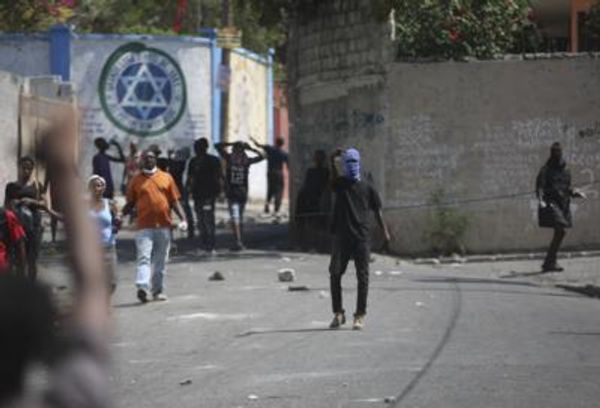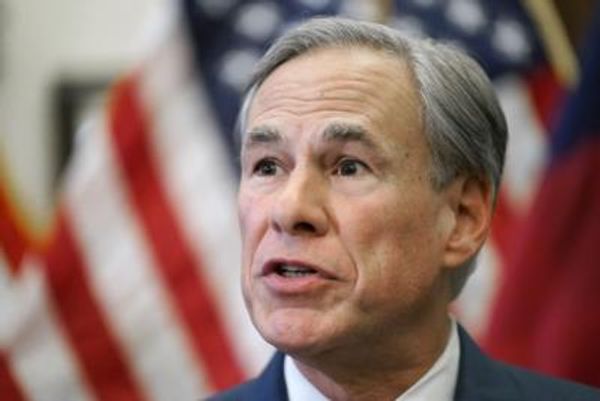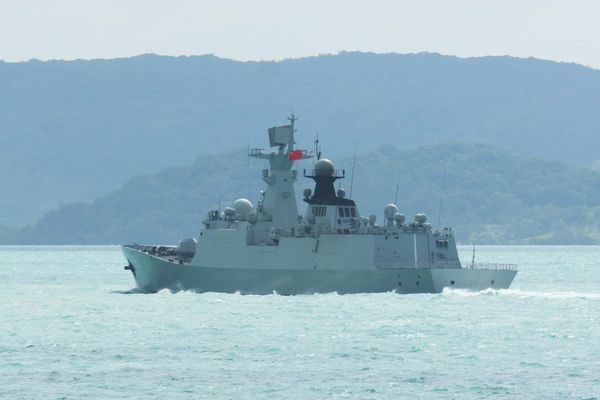
A group of US police officials visiting Israel this month in the wake of the 7 October Hamas invasion said the experience left them with worries about the US-Mexico border.
Jonathan F Thompson, executive director and CEO of the National Sheriff’s Association, said he saw “eerie” parallels between the Israel-Gaza boundary and America’s southern border.
“We don’t know about those coming into our country as we speak,” he told The Independent.
“The cartels are organised, violent beyond words,” he added. “Hamas is organised, militant, violent beyond words... The reasons why they want to undermine the country aren’t so terribly important in this case. It’s that they can, have a desire to, have the willingness, have the means, have the methods and the knowhow to do so.”
Sheriff Jim Skinner of Collin County, Texas, said he had a similar takeaway during his time on the trip to Israel, which was organised by the Jewish Institute for National Security of America (JINSA), a national security advocacy and research group.
The apparent ease with which Hamas punctured Israel’s so-called “Iron Wall” left the Texas official concerned that the militant group, or those like it, could easily enter the US.
“These people are murderers and if their leaders mean what they say and our borders are in the situation that they are, I don’t think it’s too hard to come to the conclusion that if they wanted to, these people could enter into the US, and it makes me fearful to what kind of attack they could mount,” he told The Independent. “That goes for anybody that hates Americans, who are terrorists, that represent a threat to our national security.”
An IDF officer walks past the protective barriers near the border fence with the Gaza Strip on November 19, 2023 in Netiv HaAsara, Israel— (Getty Images)
As of last month, the US Border Patrol and Department of Homeland Security both said they hadn’t seen specific and credible evidence of Hamas attempting to cross the US-Mexico border or planning an attack anywhere else in America.
How the US and Israel compare
In many ways, the Israel-Gaza border is more fortified than the the US-Mexico line, complete with concrete barriers, razor wire, an array of sensors, remote-controlled machine guns, underground concrete walls and a series of double fences.
The differences don’t end there. The US-Mexico border is 50 times longer and sees hundreds of thousands of people attempting crossings each month, including numerous people engaging in legally protected attempts to achieve residence or asylum. Israel, meanwhile, maintains a sweeping blockade of Gaza and severley restricts the movement of people in and out of the territory, conditions which human rights groups say contribute to a system of apartheid.
In fact, it is the extent of similarities between the two countries – or lack thereof – that is at the heart of a controversy involving Israeli and American police exchange programmes.
Since 9/11, local, state, and federal officials in US police departments and intelligence agencies have been participating in trips to learn from their counterparts in Israel.
US police have spent decades learning from Israeli forces, which critics allege increases militarisation— (AP)
And they continued right on through 7 October. A 32-member New York law enforcement delegation was in Israel for training when the war with Hamas began.
Backers of such efforts say the initiatives are a valuable way to foster collaboration and share information on best-practices in security, while critics allege that US officers are learning from a regime accused of using iron-fisted security tactics to enforce a system of racialised oppression.
US police visit Israel’s ‘Ground Zero’
The house in Be’eri kibbutz, Israel’s “Ground Zero,” had been reduced to rubble, but the memory of the woman who lived in it will stay with Sheriff Skinner.
It had belonged to Vivian Silver, 74, a Canadian-Israeli peace activist known for bringing together women from Israeli and Palestinian society, as well as her human rights work. She was killed in the 7 October attacks on the community, alongside at least 111 others.
“It was so sad to learn that a kind, good-hearted person could’ve been murdered, and they burned her body to complete ash,” Sheriff Skinner told The Independent, describing how he stood in the ruins of the house earlier this month. “It’s something about that was so unbelievable gut-wrenching. It just recommits me as a law-enforcement official to make sure that we’re doing everything that we can to protect our people.”
An Israeli flag placed at a destroyed house in Kibbutz Beeri, nearly a month after the 7 October attack by Palestinian militants— (AFP via Getty Images)
US police officials – including representatives from forces in Louisiana, New Jersey, and Maryland – attended briefings by the Israeli national police, toured Be’eri and Sderot, a city where Hamas fighters occupied a police station, and attended the funeral of Rose Lubin, a US-Israeli Border Police officer stabbed in Jerusalem earlier this month.
They also saw one of the most closely-guarded pieces of evidence about the 7 October attacks. They joined the small collection of journalists and world leaders who have been shown a raw, roughly 45-minute video documenting the worst abuses carried out by Hamas during the initial surprise assault. Israeli officials have described screening the video as part of their “narrative battle” against criticisms of the Israeli war effort.
Mr Thompson of the NSA said his group of touring officers were among the first non-Israeli officials to see the whole video.
“We asked to see it. We wanted to see the horror. We wanted to see firsthand to understand what we had seen all week,” he said. “It was kind of a capstone to demonstrate the totality of the horror... We got a very broad view and a very granular view of the attacks and the murders and the rapes and the killings.”
‘Close cooperation’
Such intimate contacts and exchanges with officials in Israel are the point of such trips, according to JINSA’s Steven L Pomerantz, a former FBI counterrorism official who has led numerous US law enforcement delegations to Israel.
He told The Independent that Israeli police, who preside over a country about the size of New Jersey and often respond to terror threats, are uniquely skilled at quick communication and responding to chaotic crime scenes with organisation and sensitivity.
Sometimes, police officials have mere minutes to interdict a threat and warn communities.
“That means the word has to get out to every police officer on the street. They found a way to do that,” he said. “A lot of it is technology and the remainder is they have very close cooperation they’ve built between the agencies. That is a very significant accomplishment and one that we certainly endeavour to have in the US.”
He also said that while major crime scenes and disaster zones in the US can be chaotic multi-agency messes, he’s never witnessed the same kind of disarray in Israel.
“I’ve been at the scenes of many big events. The first 20 minutes, you try to sort out who’s in charge,” he said. “None of that in Israel.”
That organisation came in handy on 7 October. While the IDF has been criticised for taking hours to reach certain communities under attack, Israeli police bore the initial brunt of the Hamas assault. They are credited in many communities with stopping the militants from being able to carry out plans to continue deeper into the country.
Attendees on the November trip also spoke approvingly of ZAKA, a volunteer rescue and recovery force, associated with Israel’s ultra-Orthodox Jewish community, which quickly and delicately recovers bodies from crime and terrorism scenes in ways that accord with religious burial practices. The group has volunteers from other religious communities in Israel as well.
Heightened tensions
Israel’s police force hasn’t come under the same kind of criticism as the IDF, who some citizens argued arrived too late to many of the border communities which came under attack on 7 October. However, they still have played a central role in the ongoing conflict – and its antecedents.
Hamas called its initial offensive against Israel Operation Al-Aqsa Flood, saying the campaign was in retaliation for the Israeli storming of the al-Aqsa Mosque/Temple Mount compound, which contains some of the holiest sites in Islam and Judaism, during the sacred month of Ramadan.
Israeli police stormed the compound in April, saying they were clearing out numerous men barricaded inside who had thrown rocks and fireworks. Video of the incursion shows officers in heavy riot gear beating Palestinians.
Demonstrators had gathered at the mosque overnight to protest a fringe Jewish group’s calls to hold a Passover goat sacrifice at the compound, NPR reports.
(The IDF reportedly had warnings that Hamas may have been planning to attack Israeli towns and bases over a year before 7 October, Haarez reports, meaning the invasion may have been planned months before the al-Aqsa raid.)
As the Israeli war against Hamas has progressed, observers say the Israeli police have also cracked down on internal dissent, announcing a “zero tolerance” policy towards pro-Gaza protests in Israel and allegedly surveilling and targeting Palestinian citizens of Israel with critical opinions.
“As far as I can tell, not a single Jewish Israeli who has issued calls to ‘erase Gaza’ or carry out a ‘second nakba,’ meaning ‘catastrophe,’ or other acts of terrorism against Palestinian civilians has been summoned by the police,” Israeli human rights lawyer and author Michael Sfard wrote this month in The New York Times.
“None of this is an accident,” he added. “The suppression of speech and targeting of critics of Israel’s policy toward the conflict has always had a strategic goal.”
Israel’s national police declined to participate in this article when contacted by The Independent.
‘Maintaining’ apartheid system
Over the years, such police exchanges with Israel have come to form a major influence on US law enforcement, involving departments across the country, as well as members of federal agenices like the FBI, CIA, and ICE.
Critics of such efforts allege that these contacts are harmful. The claim that by embedding with Israeli law enforcement, which often operates in a context blurring policing and military action, the US is exposing itself to dangerous ideas and technologies – and exacerbating longstanding issues already plaguing America’s often racist policing.
In 2021, Amnesty International concluded that Israeli control over Palestinians and their territory amounts to an apartheid system of racist domination and segregation, touching all aspects of life from employment to movement to community planning to criminal justice.
Police in Israel, according to the group, are often the tip of the spear of that effort, cracking down on protesters, supervising the demolition of homes in minority communities, and killing Palestinians with “near total impunity.”
Critics say US police shouldn’t learn from Israeli counterparts who maintain legal ‘apartheid’
During 2021 protests over evictions of Palestinians in Sheikh Jarrah, a neighbourhood in occupied East Jerusalem, “Israeli police carried out mass arrests, used excessive force against peaceful protesters, and tortured and otherwise ill-treated detainees,” according to the group.
“Security forces in Israeli are a part of maintaining that system,” Amanda Klasing, Amnesty USA’s national director of government relations and advocacy, told The Independent. “Law enforcement or security institutions that are upholding a discriminatory legal framework are not a place that you would want law enforcement to be training, and in particular when the US is going through its own reckoning over the role that law enforcement plays in upholding discriminatory systems.”
Other groups have also raised concerns. Human Rights Watch, which also considers Israel an apartheid regime, notes that in 2018 in Jerusalem, 77 per cent of children arrested were Palestinian, even though they account for less than half the population.
Israel human rights group Yesh Din, meanwhile, has found that between 2005 and 2019, Israeli police closed nine in ten complaints of settler violence against Palestinians without any indictments.
In a 2018 report titled Deadly Exchange, the advocacy groups Jewish Voice for Peace and Researching the American-Israel Alliance argued US-Israel police exchanges “are trainings with an occupying force that rules a population deprived of human and civil rights.”
”Rather than promoting security for all, these programs facilitate an exchange of methods of state violence and control, including mass surveillance, racial profiling, and suppression of protest and dissent,” the authors argue.
‘Contributing to the problem’
Sheriff Skinner told The Independent the visit inspired him to equip his deputies, who patrol a county within the Dallas-Fort Worth metro area, with a more extensive arsenal.
“I’m going to put better optics on the rifles that my deputies carry,” he said. “I’m going to increase the amount of ammunition that is mandatory, that is actually assigned to an individual police vehicle and increase the amount of ammunition that is in the field at a given time that a deputy would have available in case they were to encounter a terrorist attack.”
Deadly Exchange highlights a variety of what they argue are problematic US-Israel police contacts, from Atlanta modelling its controversial mass-surveillance video system on Jerusalem’s, to the sale of Israel-designed riot control chemicals to US police departments amid the Black Lives Matter Movement, to a now-disbanded NYPD intelligence unit that used informants nicknamed “mosque crawlers“ inside Muslim community gathering places. A former police official said the programme was modeled in part on Israeli operations in the West Bank.
Even the groups which support US-Israel police programmes have at times expressed doubts about the utility of working with Israeli police.
“In light of the very real police brutality at the hands of militarized police forces in the US, we must ask ourselves difficult questions, like whether we are contributing to the problem,” an official at the Anti-Defamation League, wrote in a draft June 2020 memo obtained by Jewish Currents. “We must ask ourselves why it is necessary for American police, enforcing American laws, would need to meet with members of the Israeli military. We must ask ourselves if, upon returning home, those we train are more likely to use force.”
After the memo was reported, the group said that evaluations of its law enforcement trips showed that the efforts “have led to stronger relationships with law enforcement that have directly helped ADL with the investigation of hate crimes and protecting local communities.”
“ADL is deeply proud of its decades of work with law enforcement across the U.S. and believes strongly that those relationships are crucial to helping protect all people from hate crimes and hate motivated violence,” the group told The Independent. “While we do not have any missions to Israel currently planned, we remain committed to law enforcement engagement and professional development nationally and internationally and are likely to expand our educational law enforcement programs in the future.”
Those who attended the JINSA trip defended the value of the exchange, describing Israel’s actions as self-defence.
“We have a constitution that we must and shall adhere to. Israel is democracy as we are,” Mr Thompson of NSA said. “They do and need to adhere to basic human rights, but those human rights stop when they are endlessly, viciously attacked. Anyone that suggests otherwise is uninformed or ill-informed or at worst, a party to what they [critics of Israel] are seeking to do, which is to wipe Israel off the face of the Earth, for no other reason because they hate them.”
Mr Pomerantz, meanwhile, said such trips are not an “indoctrination,” and said briefings mostly concerned civilian-focused Israeli policing. The trips don’t usually include visits to the occupied West Bank, with a recent exception occuring when visitors tried to meet with the Palestinian Authority police but were unable to. (Israeli police also serve border security roles and help respond to terror threats, as well as excercise partial authority in the occupied West Bank.)
“Those kinds of organization don’t like the police,” Mr Pomerantz said of critics like the authors of Deadly Exchange and Amnesty International. “I’d ask them, where do you think we should go? Tell me where you think we should go. Law enforcement, the Israeli national police, operate largely under rules very similar to ours. If from time, if there are violations of those rules, by individual police officers, that’s what happens. We have the same thing here.”







